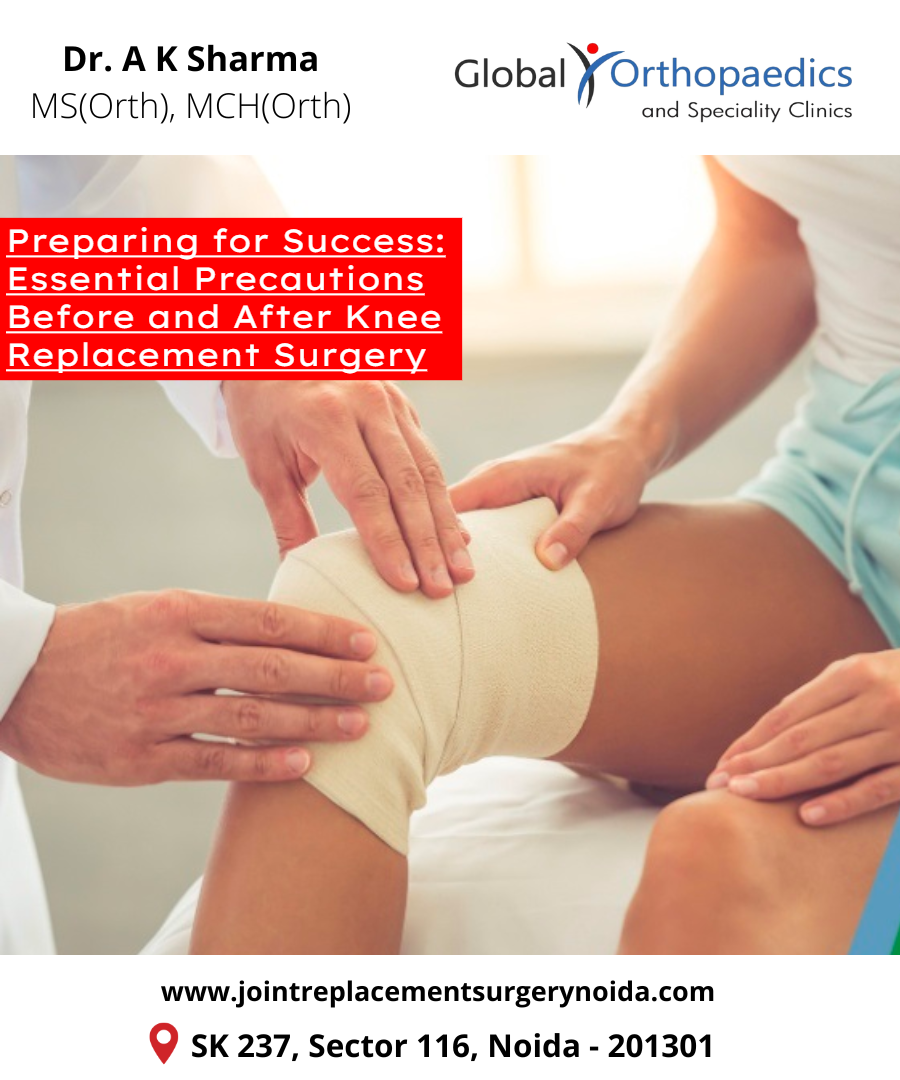+918860610089

This is your website preview.
Currently it only shows your basic business info. Start adding relevant business details such as description, images and products or services to gain your customers attention by using Boost 360 android app / iOS App / web portal.
Preparing for Success: Essential Precautions Befor...

Preparing for Success: Essential Precautions Before and After Knee Replacement Surgery Knee replacement surgery is a life-changing procedure that can significantly improve your mobility and quality of life. However, like any major surgery, it's crucial to take proper precautions before and after the procedure to ensure a smooth recovery and optimal results. This blog will guide you through essential steps to prepare for a successful knee replacement surgery experience, maximizing your chances of a positive outcome. Pre-Operative Preparation: Building a Strong Foundation Consultation with the Best Knee Replacement Surgeon in Delhi NCR: The first step is finding a highly skilled and experienced surgeon. Look for a surgeon in Delhi NCR with a proven track record of successful knee replacement surgeries. Research their qualifications, experience, and success rates. Open Communication with Your Surgeon: During consultations, discuss your medical history, current limitations due to knee pain, and expectations for post-operative recovery. Ask questions about both conventional and robotic-assisted knee replacement surgery options, allowing your surgeon to recommend the approach best suited for your specific needs. Pre-Operative Medical Evaluation: Your doctor will order blood tests, X-rays, and potentially an MRI scan to assess your overall health and determine if you are a suitable candidate for surgery. They might also recommend addressing any underlying medical conditions that could impact your surgery or recovery. Strengthening Your Legs: Pre-habilitation exercises are crucial to build strength and flexibility in your leg muscles. These exercises will increase your post-operative recovery potential and improve your ability to participate in physical therapy. Your doctor or physical therapist will guide you through a personalized exercise program specifically designed for your needs. Lifestyle Modifications: • Weight Management: If you are overweight or obese, losing some weight before surgery can significantly improve surgical outcomes and reduce stress on the new joint. • Smoking Cessation: Smoking can negatively impact healing and increase the risk of complications. Quitting smoking well in advance of the surgery is highly advisable. • Managing Medications: Discuss all medications you are taking with your doctor. They might need to adjust or discontinue certain medications before surgery. • Home Modifications: Make your home environment recovery-friendly. Install grab bars in your bathroom, remove throw rugs, and ensure furniture is at an appropriate height. Day of Surgery: Preparing for the Procedure • Fasting: Follow your doctor's instructions regarding fasting before surgery. • Medication: Take any pre-operative medications as directed by your doctor. • Clothing: Wear loose-fitting clothing that allows easy access to the surgical site. • Emotional Support: Having a loved one available to offer emotional support and help you navigate the pre-operative process can be beneficial. Post-Operative Care: Key Steps to Recovery Pain Management: You will experience pain after surgery. Your doctor will prescribe medications to manage your pain effectively. Physical Therapy: A dedicated physical therapy program is vital for regaining strength, flexibility, and range of motion in your knee. Actively participate in your rehabilitation program to optimize your recovery. Wound Care: Properly care for your incision site to prevent infection. Your doctor will provide specific instructions on wound care and dressing changes. Preventing Blood Clots: Your doctor might recommend blood-thinning medication or compression stockings to minimize the risk of blood clots after surgery. Managing Swelling: Swelling is expected after surgery. Your doctor might recommend applying ice packs and elevating your leg to reduce swelling. Diet and Nutrition: Maintain a healthy diet rich in essential nutrients to promote healing and tissue repair. Gradual Return to Activities: With your doctor's approval, gradually resume daily activities and exercises to rebuild strength and endurance. Avoid strenuous activity until cleared by your doctor. Finding the Right Support System: Enlist the help of family and friends during your recovery. Having a support system can assist you with daily tasks like cooking, shopping, and transportation. Listen to Your Body: It's important to listen to your body during the recovery process. Don't push yourself too hard, and take rest breaks whenever needed. Report any unusual pain, swelling, or fever to your doctor promptly. Conclusion: Taking Charge of Your Recovery Journey Knee replacement surgery, whether performed by the best knee replacement surgeon in Delhi NCR or elsewhere, can be a powerful tool to restore your mobility and independence.

